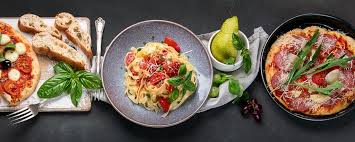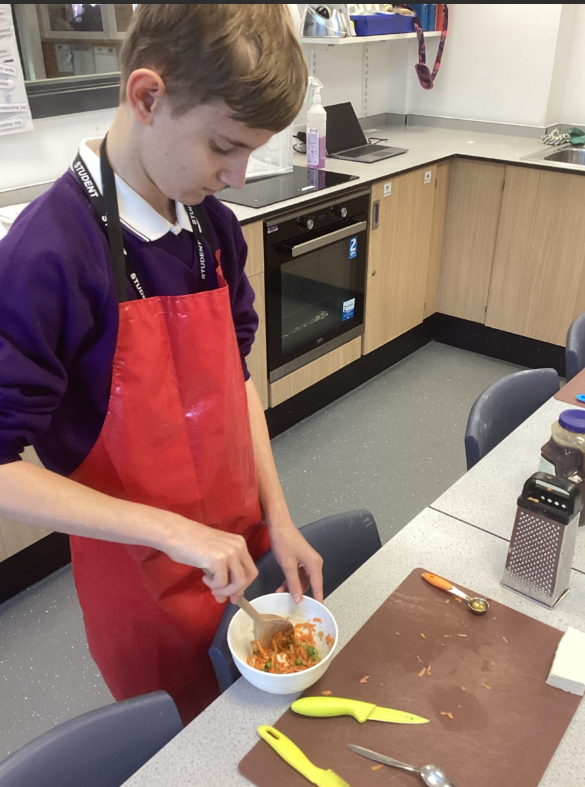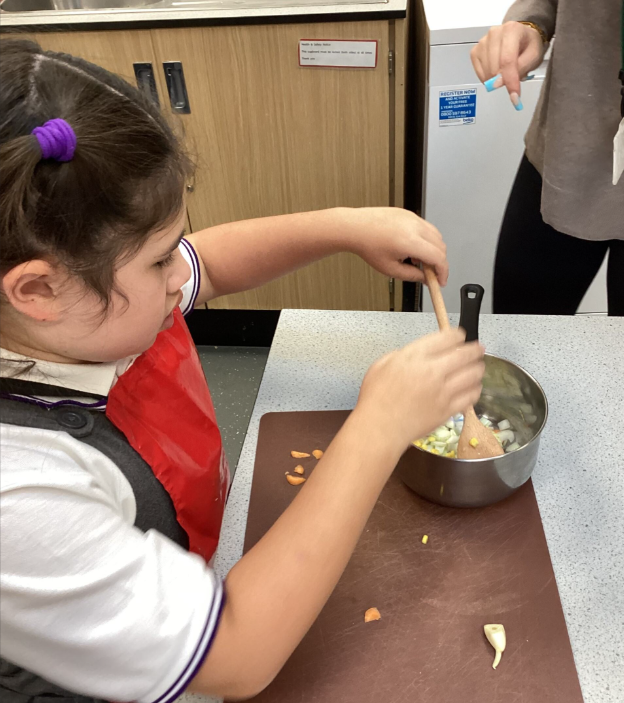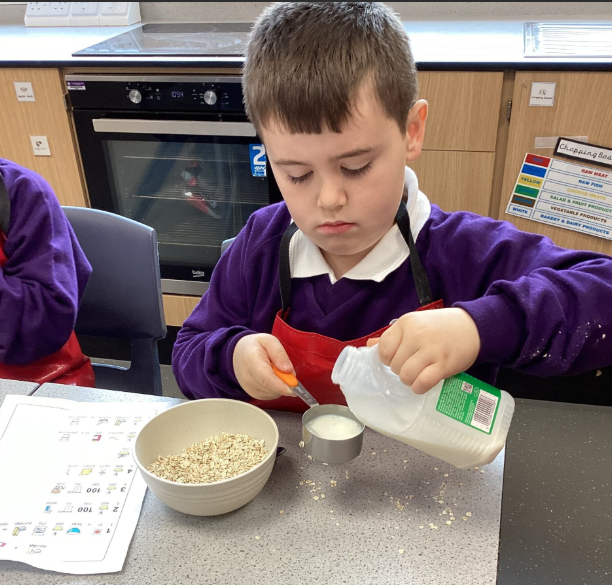Food Technology

Food Technology Curriculum Vision
Intent
The Food Technology curriculum at our Special Educational Needs (SEN) school is designed to provide all learners, from Early Years Foundation Stage (EYFS) to Post 16, with essential skills that promote independence, communication, emotional-regulation, resilience, and confidence in managing their dietary needs. We aim to create a nurturing environment where every student can explore, engage, and learn about food preparation, nutrition, and safe cooking practices.
Our intent is to:
-
Develop practical skills: Equip students with the competencies necessary for safe food preparation and cooking, tailored to their individual needs and abilities.
-
Foster nutritional awareness: Instil understanding about nutritional values and healthy eating habits, empowering students to make informed choices about their food.
-
Encourage creativity and expression: Provide opportunities for students to engage in creative cooking and food presentation, facilitating personal expression and enjoyment in the kitchen.
-
Promote social skills: Encourage collaborative activities that build teamwork, communication, and social interaction among students.
-
Support individual progression: Tailor the curriculum to meet the diverse needs of our student population, enabling personalised learning pathways that promote achievement and success for all.
Pupils will be taught to:
Key stage 1
-
use the basic principles of a healthy and varied diet to prepare dishes
-
understand where food comes from.
Key stage 2
-
understand and apply the principles of a healthy and varied diet
-
prepare and cook a variety of predominantly savoury dishes using a range of cooking techniques
-
understand seasonality, and know where and how a variety of ingredients are grown, reared, caught and processed.
Key stage 3
-
understand and apply the principles of nutrition and health
-
cook a repertoire of predominantly savoury dishes so that they are able to feed themselves and others a healthy and varied diet
-
become competent in a range of cooking techniques [for example, selecting and preparing ingredients; using utensils and electrical equipment; applying heat in different ways; using awareness of taste, texture and smell to decide how to season dishes and combine ingredients; adapting and using their own recipes]
-
understand the source, seasonality and characteristics of a broad range of ingredients.
Key stage 4
The Pearson BTEC Level 1 and Level 2 Awards in Home Cooking Skills have been developed to give learners the opportunity to develop:
• the knowledge, understanding and confidence to cook meals at home
• an understanding of how to economise when planning a meal
• an ability to transfer skills learned to different recipes
• an ability to inspire others by transferring that knowledge.
Implementation
The implementation of the Food Technology curriculum is centred on three key principles: structure, engagement, and support.
-
Structured Curriculum:
-
A well-organised curriculum that progresses through thematic units; starting from understanding basic food hygiene, moving to simple recipes, and advancing to meal planning and preparation as students progress through EYFS to Post 16.
-
All students, from EYFS to Post-18, participate in weekly Food Technology sessions. In the Upper Phase, students focus on working towards their BTEC qualification.
-
Engaging Experiences:
-
Lessons are highly interactive, employing a variety of teaching methods, including hands-on cooking sessions, visual aids, and sensory experiences to cater to different learning styles and engage all students.
-
Use of technology, such as digital recipes and cooking apps, to enhance learning and appeal to students' interests.
-
Individualised Support:
-
Staff are trained to recognise and support individual learning needs, employing adapted resources, scaffolded instruction, and differentiated tasks.
-
Collaborations with therapists and specialists to incorporate sensory needs, ensuring a holistic approach to learning.
-
Regular feedback from students and parents to share experiences, refine practices, and adjust lessons to maintain relevance and engagement.
Impact
The impact of our Food Technology curriculum is measured through various indicators that demonstrate significant progress and achievement amongst our students:
-
Skill Acquisition: A high percentage of students demonstrate proficiency in basic cooking skills and knowledge of nutrition, evidenced through practical assessments and student portfolios.
-
Increased Independence: Students show increased confidence and ability in food preparation and meal planning, as observed in their independent projects and daily routines.
-
Healthy Choices: Surveys indicate improved understanding of nutritional information and a positive shift towards healthier food choices amongst students.
-
Social Improvement: Enhanced social skills and collaboration are observed during group cooking sessions, with students actively communicating and supporting each other.
-
Parental Engagement: Positive feedback from parents regarding students’ ability to contribute to family meals and discussions about nutrition, highlighting the extension of learning beyond school.
In summary, our Food Technology programme is characterised by a clear intent to enhance life skills, robust implementation that ensures engagement and support, and a profound impact that prepares students for a future of healthy living and independence. This comprehensive approach is reflective of best practices and aligns with the standards for outstanding teaching and learning as outlined in Ofsted's most recent framework.




